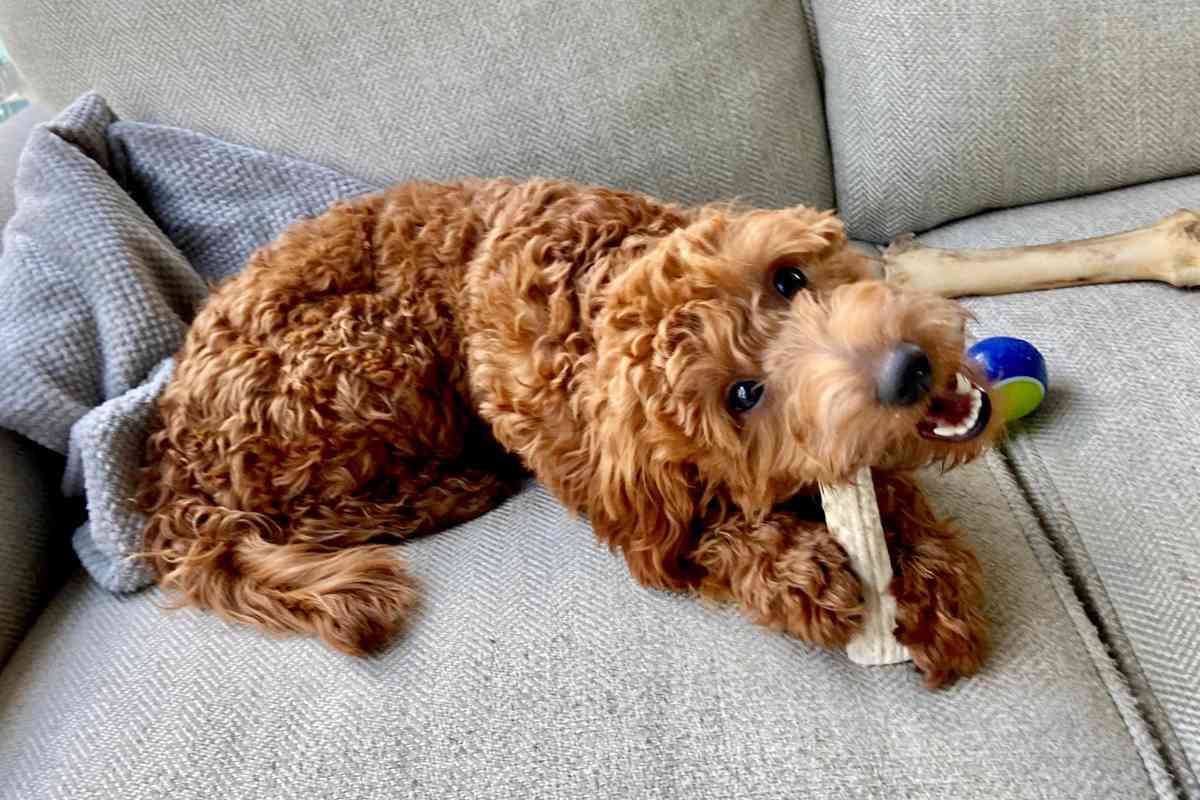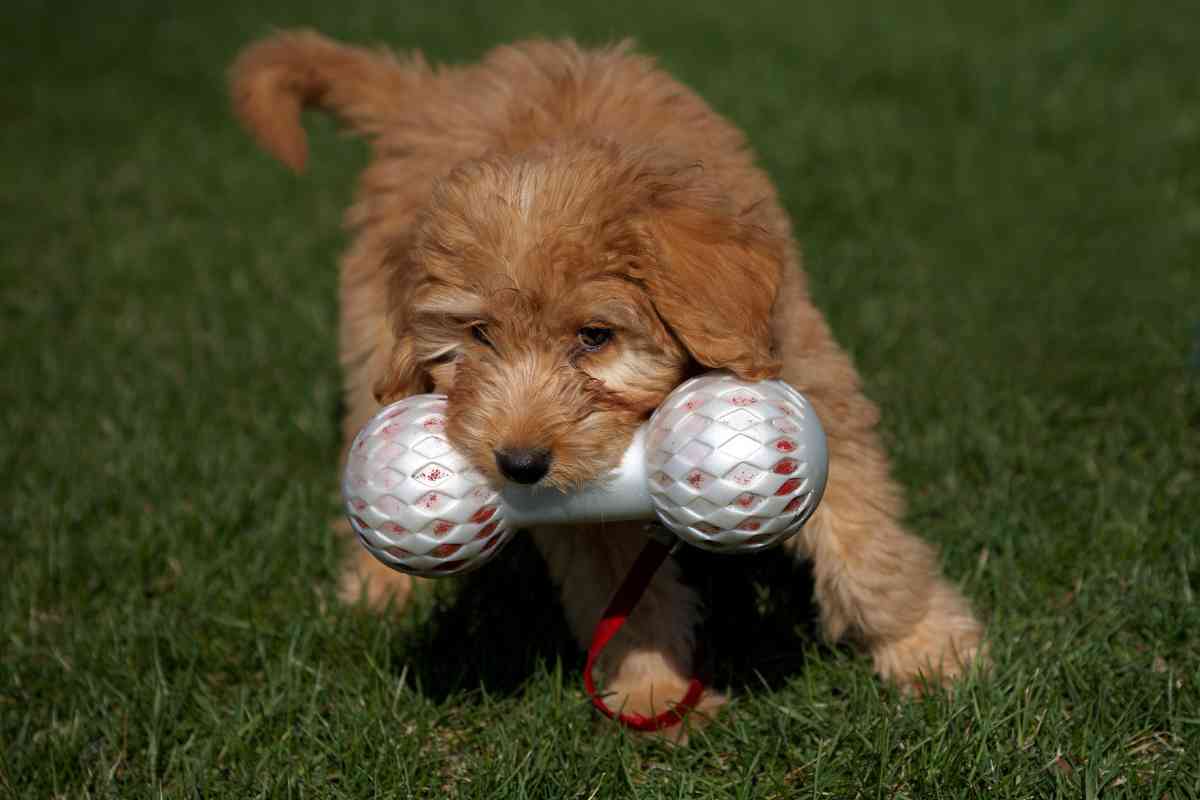When Goldendoodles Stop Teething And Lose Their Puppy Teeth
When do Goldendoodles lose their puppy teeth? Understanding the timelines helps you plan as a pet parent considering the strange behaviors of puppies then.

When do Goldendoodles lose their puppy teeth?
Most Goldendoodles lose puppy teeth between 6 to 8 months. Initially, they grow their baby teeth at 2 to 4 weeks from birth, which is later pushed out by the permanent adult teeth when they reach 3 to 4 months. This continues for 6-8 months when 42 adult teeth grow.
Our findings from breeders reveal that the teething process happens subtly and mostly begins after two months. Most breeders notice puppies shed their sharp milk teeth first and sometimes swallow them.
We have compiled information from breeders and vets that help you understand the teething process and make it easy for you to prepare.
Golden Doodle Puppy Teething Timelines
As a pet parent or new pet owner, you do not want some things to catch you by surprise. This means keeping abreast of the changes happening in your puppy’s life.
Below are some of the few teething facts you ought to understand.
- Your puppy is born with no teeth from age 0 and may remain toothless for up to two weeks.
- The puppy’s first baby teeth grow from week 2 to week 4. At this stage, the incisors, molars, premolars, and eventually the canines come out.
- By weeks 5 to 6, the puppy’s baby teeth should be fully developed.
- By week 8, most milk teeth (baby teeth) begin to fall out in preparation for the adult teeth.
- The puppy begins to grow adult teeth at month 3 to month 4. They start shedding their baby teeth slowly, which are then replaced by permanent adult teeth.
- Most puppies get complete sets of permanent adult teeth between month 6 to month 8
When Will My Goldendoodle Puppy Stop Teething?
Chances are that the Goldendoodle will stop teething between the 6th and 8th month from when they were born.
This is because the baby teeth that grew after the first two weeks will be pushed out by the adult teeth when the puppy gets to 3 months, and the rest of the adult teeth will grow gradually. Most puppies have their adult teeth fully emerging by the time they are 6 to 8 months old.

How to Tell When your Goldendoodle Puppy is Teething?
There are a few obvious signs you may indicate your puppy is teething. You may realize that the puppy is chewing at everything and everyone and that a few of their baby teeth are absent. While these are the most common signs, other signs confirm that your puppy is teething.
- You may notice the puppy chewing excessively
- The puppy could be over-drooling
- There may be cases of bleeding and swollen or red gums.
- You may witness actual falling out of the baby’s teeth
- Some puppies develop decreased appetites
- Puppies may become more vocal
- There could be frequent stomach problems
- Some puppies develop changes in bowel movement
- A few puppies exhibit low fever
How Do You Handle a Teething Goldendoodle?
Most pet parents struggle with teething puppies, especially for the first few days. Usually, the first set of baby teeth is sharp and can hurt your hand. You also do not want your puppy to develop the bad habit of chewing on everything.
Most of the time, the behaviors you allow your puppy to get away with continue into their adulthood.
This unpleasant behavior can be a turn-off, so you want to take charge when the puppy is still young. Training your puppy is a continuous process that requires some level of dedication.
Get them Safe Chew Toys
One of the first things you can do is distract the puppy. Get a toy or chewing device that shifts the puppy’s attention from your hands. Note that most puppies bite and chew stuff to soothe themselves, so safe chew toys are the best alternative for most of them.
Monitor their Progress and Involve your Vet when Needed
Also, make sure to pay close attention to your teething puppy. The experience is not the same for all of them. Some puppies may be affected to the point of bleeding in the gums. Close monitoring is advised at this stage.
When things get out of hand, for instance, over-bleeding, it is best to call your veterinary officer for a medical checkup. The process of adult teething pushing the baby teeth away from the gums can be painful and uncomfortable. The vet may help with the teeth removal process and even prescribe some medication for the discomfort and pain.
Monitor their Appetite
You also want to watch out for puppies that struggle to eat. Many lose their appetite due to the pain, which hurts their eating. Usually, their digestive system is disrupted, and many develop upset tummies.
However, allowing the puppy to go without food is wrong, as this can lead to malnutrition and other consequences. You can consult your vet for the proper steps since you may need to put your puppies on a special diet during this phase.
What Should I feed my Golden Puppy when Teething?
The teething experience is different for each puppy. Some develop swollen gums, bleeding gums, diarrhea, low fever, and other complications, while others go through this phase unnoticeably. Therefore, feeding them right is essential to avoid elevating any discomfort.
If your puppy struggles with appetite, you may want to shelve the kibble diet. Instead, choose delicious, tasty foods, preferably wet puppy formulas. The idea is to get your
If you are dealing with an appetite loss issue, you may want to ensure that you make the food more flavorful. For example, you can warm the food or even look for a way to soften the kibble using warm, clean water. Find ways to make the food more enticing.
Fortunately, there are several testing-friendly puppy foods out there. Find a company specializing in making this food and invest for the season.
Will my Goldendoodle Get Sick When Teething?
This is probably one of the leading causes of concern for any pet parent with a Goldendoodle puppy. One that is guaranteed is that the process can be very uncomfortable and irritating, which is why most puppies chew and bite on things as a soothing coping mechanism.
However, some puppies have it rough and may even get sick.
It is also prevalent for some puppies to develop diarrhea, tummy concerns, soft stool, loss of appetite, and low fever. The good news is that all these signs and symptoms can be monitored and remedied by a professional vet. Make sure to walk with one through this phase or stage.
Should I Worry About a Teething Disorder with my Goldendoodle?
Goldendoodles are not very different from other dog breeds. It means that they could also develop specific teething disorders. The most common issues are cases of baby teeth failing to emerge and adult teeth refusing to appear.
In some cases, some puppies develop more than 42 adult teeth. This often leads to malocclusion, which is a case of an abnormal bite.
If you suspect something is wrong with your puppy during this stage, it is advisable to consult your vet.
Is there a Specific Time when the Teething is Considered Its Worst?
Goldendoodle puppies’ teeth are in stages, depending on their age. Since puppies have no teeth at birth, they will develop their first teeth (milk teeth) after two to four weeks. These teeth are often very sharp and can easily hurt when the puppy bites you.
Baby or milk puppy teeth are 28 in total. Since these teeth are very sharp, they may be considered the most dangerous.
Is there a Time that your Puppies Need the Most Support when Teething?
Usually, from week 5 to week eight, the puppies may need a lot of support. The milk or baby teeth are all in and begin to fall off soon as new adult teeth develop. Watch them closely and help when needed.
Key Takeaways
- Puppies’ teething is progressive and happens in age-inspired phases
- Goldendoodles puppies will exhibit specific symptoms that indicate they are in the teething stage.
- The teething process can be delicate and should be closely monitored
- Most puppies develop their first set of teeth by week 5 to week 8
- Many puppies will have a complete set of adult teeth by the 8th month of their development.